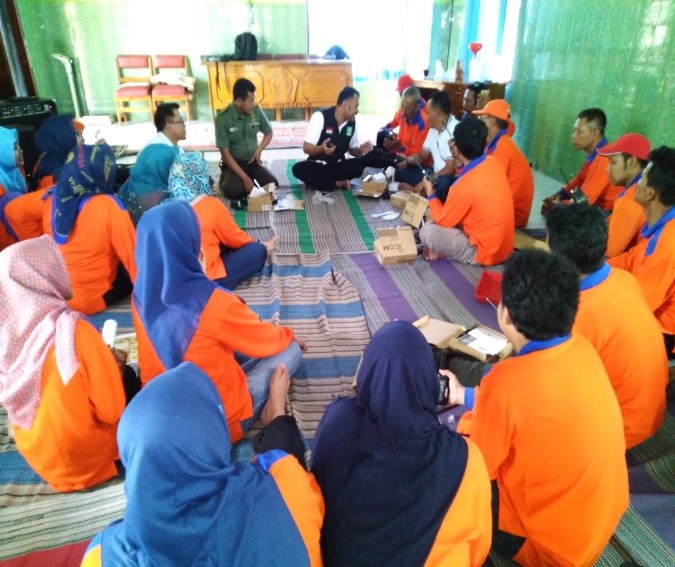Climate and Disaster Resilience Community Forum in Sutojayan Village

This success story is by Herry Susanto, Governance/Institutional Strengthening Specialist USAID APIK East Java. It was originally published on the USAID-APIK website on 29 March 2019.
The success story is available in Indonesian here.
Vulnerability to flooding
Blitar District in East Java experienced many disasters, including floods, landslides, and whirlwinds between 2010 and 2017. One area that has been hit by floods is Sutojayan Village. The name Sutojayan comes from the Javanese words “Suto” (meaning child) and “Joyo” (meaning happiness). The village location was once a dense forest located downstream of the Bogel River which is a sub-river basin of the Brantas watershed. The multiple flooding events are most likely caused by the deforestation happening upstream in the watershed namely in Bacem Village and Kalipang Village. The conversion of catchment areas into paddy fields and as sites for building construction has also contributed to the problem.
The flooding that often hits Sutojayan makes the community increasingly vulnerable. It disrupts the economy, decreases clean water supply, damages road infrastructure, schools, homes and more. For example, on February 11, 2017, floods hitting Sutojayan reached a water level reaching 70 cm (half of average adult’s height). In addition to submerging hundreds of homes, the flood also damaged around 150 hectares of rice fields that had just been planted with seeds. As a result of this event, USAID Adaptasi Perubahan Iklim dan Ketangguhan (USAID APIK) with the Climate Adaptation and Disaster Risk Reduction Working Group (Pokja-API-PRB) under the coordination of the Blitar District Planning and Development Agency (Bappeda) agreed to assist Sutojayan Village with its flood management.
A community forum to strengthen resilience
At the community level, USAID APIK actively undertook a series of approaches to provide knowledge on disaster management. Together with the community, the project formed a communication forum for flood management in 2017 called Forum API-PRB (climate and disaster resilience forum). It involved youth, men, women, farmers, traders, village government, army, and police representatives in Sutojayan Village. Through the Climate and Disaster Resilience Forum activities, the community has held several participatory meetings to discuss flood management issues. Through the activities, and with the involvement of the Local Disaster Management Agency (BPBD) and the Blitar Environmental Agency (DLH) it has increased the enthusiasm of the community to participate.
Mr. Kusnadi is one of the community leaders and very influential as a development champion in Sutojayan. He is actively involved in the Climate and Disaster Resilience Forum and acts as a liaison for the working group members who are mostly from government agencies. He also monitors the condition of Bogel River especially during heavy rains and shares the information through a ‘handy talkie’ (a portable two way radio transciever). According to Kusnadi, a lot of people choose to stay at home despite the flood because they are used to the situation. He further explained that if the flood level does not reach their front door, then the community will not evacuate. This is an example of many other things that need to be discussed with the community members to improve flood management.
Sutojayan Village Climate and Disaster Forum outcomes and impact
Through the Forum, the community was trained to read disaster maps in their area, formulate actions to make infiltration wells (biopores) to reduce runoff and prepare proposals for flood management training activities such as a public kitchen exercise. The results of these various discussions were then brought into the development planning public consultation process at the village, sub-district, and district levels. Some of the proposed activities by the community were followed up by the Environmental Agency.
In August 2017, the Forum held a biopore infiltration holes making event, planting trees for conservation, and plastic and garbage cleaning activity in Bogel River as part of Indonesia’s independence day celebration. Some other proposed activities discussed in the community forum and carried out jointly with the village officials were drafting village regulations on environmental management and improvement, trees protection, and selecting forum members to be included in the flood task force team at the village level.
To further provide broader results in flood management, some members of the Climate and Disaster Forum actively participated in overseeing program planning proposals through the village public consultation activities. This activity is a vehicle for dialogue between the village government and the community. It facilitates the village annual program development that meets the community needs.
However, not all community proposals can be approved as programs by the district government. There are considerations regarding the priority scale and the financial capacity of the administrative area. Therefore, to encourage efforts in implementing the community proposals, support from other stakeholders are needed. In 2018, as a result of the Forum communication to the Development and Planning Agency (Bappeda) that further extended the discussion to other institutions, flood management came to the attention of central government and they allocated state budget of Rp 185 billion for Bogel River and Kesing River normalization.
From the implementation of the Climate and Disaster Forum activities, the members and broader community gained a better understanding of floods and their mitigation. They learned how to arrange activities, to oversee development planning. In the future, they will continue to oversee developed proposals and to advocate to relevant government agencies such as the Disaster Management Agency, Environmental Agency, and Planning Development Agency. Also, the forum continues to perform joint activities to reduce flood risks such as trees planting, river cleaning, and capacity building to the other community members.
(0) Comments
There is no content